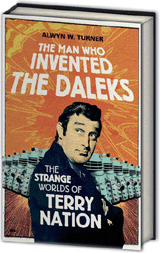 Have a trawl on YouTube and you’ll find an old clip of Jon Pertwee taking umbrage with the answer of a competition question, namely ‘Who invented the Daleks?’ While the usual names fly around – Terry Nation, Raymond Cuswick, and, indeed, Davros – once reading this absorbing biography from Alwyn W Turner, it comes as something of a surprise to learn that if anyone has a claim, it may as well be Tony Hancock.
Have a trawl on YouTube and you’ll find an old clip of Jon Pertwee taking umbrage with the answer of a competition question, namely ‘Who invented the Daleks?’ While the usual names fly around – Terry Nation, Raymond Cuswick, and, indeed, Davros – once reading this absorbing biography from Alwyn W Turner, it comes as something of a surprise to learn that if anyone has a claim, it may as well be Tony Hancock.
It seems that whilst they were writing partners, Nation and Hancock had a good deal of late night boozy conversations that involved life, the universe, and, well, everything, and Hancock came up with an idea for a long dead planet populated by monsters with eyes on stalks. The idea of Nation recycling ideas that were not strictly his own – and, crucially, getting away with it (the famously bad tempered Hancock seemingly did nothing more than mock outrage at his idea being nicked) – is a recurring theme in this book.
Hancock (sort of) inventing the Daleks is a surprise, but since many of the stories about the creatures’ inception have been too well told already, Turner realises that he can be a lot more interesting when talking about almost every other aspect of Nation’s career, which also included contributing to episodes of The Avengers, The Persuaders!, The Champions, Department S and The Saint. (Famously, the creation of that second Doctor Who story happened so banally that Nation was required to invent a story about how he wrote the story – it was only years later that he felt able to tell the truth: simply, he just wrote it).
This is as much a history of the BBC when it made the name and reputation that it still thrives on today, when writers and producers could walk into a boardroom with half an idea and come out with a full series. It’s also a story of luck and chance: Nation got his first break when Hancock fired scriptwriting team Bob Monkhouse and Denis Goodwin (and by the way, that particular relationship is long overdue to be told in one of those BBC dramas).
Turner tells an interesting tale and acts as an engaging guide, which is a neat trick, since, like the story behind the Daleks, there’s not a great deal to tell, particularly in the case of Nation who felt happy to return to the same kind of story time and time again (infamously told by the Doctor Who production team in the early seventies that his submitted idea was a very good story – so good, in fact, that they’d already bought it three times already). However, there’s no judgment here. In fact, he’s so careful not to take sides that it’s a little frustrating: it becomes impossible to really tell what he thinks of his subject.
What’s refreshing though is that there’s no attempt to lionise his subject, acknowledgingthat there are certainly limitations to Nation as a writer – recycling ideas (and even whole reams of dialogue) seemingly for no other reason than laziness. Nevertheless, if Nation had his limitations as a writer, there was no such problem when it came to his skills as a storyteller. The distinction may seem pedantic, but it’s important. Nation had a great eye – and ear – for television, managing to dump necessary exposition into scenes where it was barely noticeable, even if his love for the ticking bomb became something of a cliché.
Speaking of clichés, we can thank Nation for the Doctor Who girl twisting her ankle while escaping (patron: Susan Foreman), but otherwise, Nation’s stories are littered with strong, independent and resourceful women, in an era where such a thing was a rarity (lest we forget, the lead character in his Survivors series is a woman, and in the seventies, this is almost certainly a conscious decision).
Interestingly for a writer whose genre ended up swinging between sci-fi and fantasy, many of his characters preferred not to get into fights and were staunchly anti-war. The only exception to this, ironically, is The Daleks, where the TARDIS crew persuade the peace loving Thals to renounce their pacifism. It’s notable that the concept of a group of idealist space travelers convincing a beautiful race of aliens to take back their planet by force is still turning up in films like Avatar. Presumably the great recycler Nation would be amused to see his ideas continuing after his death.
If Nation had given himself more time to be original about his creations, it’s highly doubtful that he’d have discovered anything quite as unique – and beyond replication – as the Daleks. What’s also fairly beyond doubt is that if he’d had a chance to hack out any other story, then it’s likely that Doctor Who would be nothing more than a fondly remembered – but quickly cancelled – kids’ show from the early sixties. Nation may – or may not have – invented the Daleks, but he almost certainly saved their greatest enemy from the edge of destruction.
![]()
Published on Wednesday 25th May 2011 by Aurum Press Ltd.

